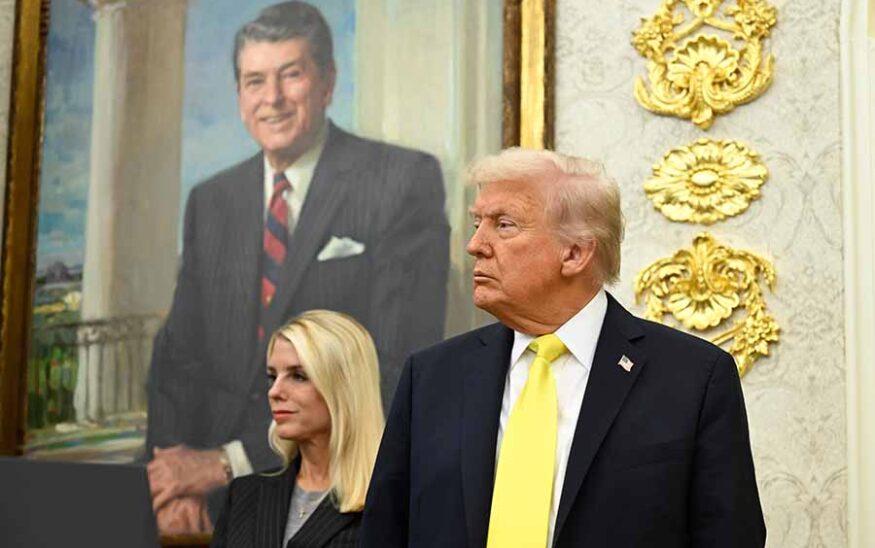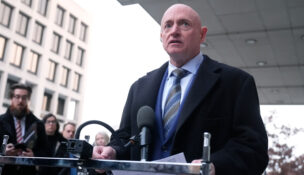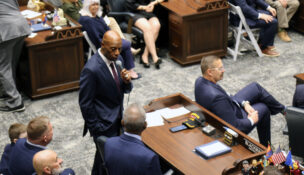Trump issues pardons to allies in election fraud scheme
Howard Fischer, Capitol Media Services//November 10, 2025//
Trump issues pardons to allies in election fraud scheme
Howard Fischer, Capitol Media Services//November 10, 2025//
Key Points:
-
President Trump issues federal pardons to 18 people connected to his efforts to overturn his 2020 election loss
-
The pardons do not affect the 18 people indicted on state charges in Arizona
-
Trump’s pardons do not include himself
President Trump has issued federal pardons to everyone connected with his various efforts to overturn his loss in the 2020 election.
But none of that will help the 18 people who were indicted in Arizona on state charges in connection with what Attorney General Kris Mayes called a scheme to have the votes of 11 “fake electors” from Arizona made official.
The pardons come less than two weeks before Mayes must decide whether to renew her case after the grand jury indictment against them was dismissed. Maricopa County Superior Court Judge Sam Myers said her prosecutors did not present all the relevant information to the jurors who handed up the indictment last year.
Even if the indictment is resurrected — or she takes the case back to a new grand jury — Mayes still faces the fact that Myers said there is at least some reason to believe that she is going after the defendants for their political views. Myers has deferred a final ruling on that until the question of the indictment is resolved.
And there’s something else that could affect a final decision: Mayes, who narrowly won her office in 2022 by just 280 votes, is seeking reelection this coming year.
“Politicians always think about the next election,” said Anthony Kern, a former state senator who was indicted on charges of fraud, conspiracy and forgery. And that, he said, has to be on her mind if she has to start over again.
“By the time she picks a new grand jury and is well into that process, she’s going to be well into the 2026 election cycle,” Kern said. “And I don’t think she wants that albatross hanging over her head.”
Dennis Wilenchik, who is defending James Lamon in the case, has his own take.
“I think it’s another message to Kris Mayes to move on,” he said. “If she doesn’t move on it’s going to cost her politically … I think everybody’s tired of it.”
And Jake Hoffman, a current state senator seeking reelection who also was indicted, said the pardon “serves as further evidence of what I’ve said all along: I’m innocent and will be vindicated by the judicial process.” He also said what happened in Arizona was not by chance.
Hoffman also said all this was part of a “coordinated conspiracy” by the Biden administration to weaponize the FBI, the Department of Justice and state prosecutors.
Richie Taylor, a spokesman for Mayes, would not comment on the presidential action.
He acknowledged the Nov. 21 deadline, but said no decision has yet been made.
Still, there may be reason to believe the case will go away.
While the indictment dates only from 2024, it is based on activities from right before and after the 2020 election.
Since then, Biden gave up on his own bid for reelection. And Vice President Kamala Harris, who headed the 2024 Democratic ticket, lost the race not only nationally but also here in Arizona by more than 187,000 votes.
Similar cases against electors and Trump allies have fallen apart in other states, with a Michigan judge tossing the charges from a case that stalled in Georgia after Fulton County Attorney Fani Willis was disqualified from pursuing the charges over a “significant appearance of impropriety” related to a romantic relationship she had with a top prosecutor on the case.
Prosecutors in New Mexico and Pennsylvania never brought charges.
Other cases in Nevada and Wisconsin, however, remain alive.
Central to all of the cases is the claim that Trump and his allies created a scheme to have Republicans in battleground states submit paperwork claiming they were the legal electors. If nothing else, that was designed to get Mike Pence, then the vice president and the presiding officer of the Senate, to refuse to accept the official results from Arizona and other states and prevent Biden from getting the necessary 270 electoral votes.
The indictment named not just the 11 people who signed the certificate that was sent to Congress but also those in the Trump orbit. That includes former White House Chief of Staff Mark Meadows and several of Trump’s attorneys, including John Eastman, Christina Bobb and Rudy Giuliani.
Another Trump attorney, Jenna Ellis, already has a deal to have the charges dismissed based on a promise to cooperate with prosecutors.
Also on the pardons list was Kenneth Chesebro, who had been a legal adviser to the Trump campaign. He had already met with investigators in Arizona even before the indictment was issued, and was never charged along with the others. And Mayes has already put him on a list of witnesses she intends to call at trial.
What Trump issued grants “full, complete, and unconditional pardon” for anything related to “advice, creation, organization, execution, submission, support, voting, activities, participation in or advocacy for any slate or proposed slate of presidential electors.” And it is written in a way to support Trump’s ongoing contention that he didn’t lose to Biden, pardoning those on the list for “any conduct relating to their efforts to expose voting fraud and vulnerabilities in the 2020 Presidential Election.”
All this is on top of the president’s decision to issue blanket pardons to nearly 1,600 who had been charged — and in some cases convicted — of federal crimes associated with the attack on the Capitol on Jan. 6, 2021, the day Congress was reviewing the electoral votes from Arizona and other states.
If Mayes continues the case, whether because the Supreme Court overturns Myers’ decision, the indictment was flawed or decides to convene a new grand jury, the next legal battle is over something called the Strategic Lawsuits Against Public Participation law.
In essence, that law says that defendants in cases can ask for dismissal — even before a trial — if they can prove “the legal action was substantially motivated by a desire to deter, retaliate against, or prevent the lawful exercise of a constitutional right.”
Myers ruled earlier this year that there was at least some evidence presented by defendants that the charges were brought at least in part over some of their exercise of their rights of petition and speech. There has been no final ruling, with all that pending whatever happens with the grand jury indictment.













































